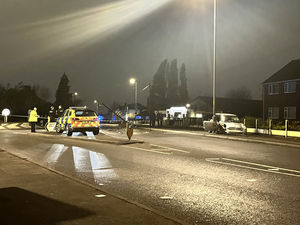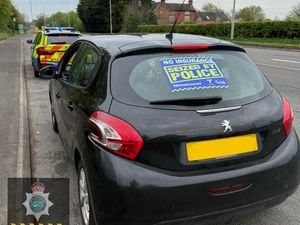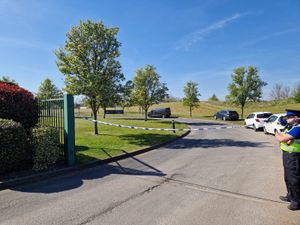Only five per cent of rape cases in West Midlands end in court
Only five per cent of reports of rape in the West Midlands since 2016 have resulted in a suspect ending up in court.

More than 13,600 reports were made to police over the last five years, but a suspect was charged or summoned to court in only 648 cases, figures obtained by the Express & Star have revealed.
Last year, just 1.5 per cent of cases ended with a suspect being charged.
The data is another illustration of the difficulty detectives face in securing convictions for rape suspects and the lack of justice for victims. It suggests most people who commit rape are unlikely to be caught.
But campaigners insist the figures are evidence of a system that is failing rape victims and say changes must be made to ensure they get justice and rapists are locked up.
Thousands of investigations broke down either because the victim stopped co-operating, a suspect couldn't be identified or because of "evidential difficulties".

Reports of rape recorded by West Midlands Police climbed every year from 2016, when the figure was 1,573, to 2020, when it was 3,139. There were a total of 13,650 reports from 2016 to the start of 2021.
Some 4,616 cases ended despite a named suspect being identified as the victim did not support police action or had changed their minds. Another 3,177 cases were closed after being "investigated as far as possible" without identifying a suspect.
There were also 2,795 cases where a suspect was identified with victim support but where the investigation collapsed due to "evidential difficulties".
Pamilerin Beckley, from The Haven in Wolverhampton, which supports vulnerable women, said she believed the approach of many rape investigations led victims to stop co-operate and insists better support is needed for victims.
West Midlands Police suggested the struggles to achieve prosecutions were partly down to a rise in reports in line with the "national situation" but said they were determined to improve conviction rates.
Failed
Rape victims are being failed by a criminal justice system that does not always put their needs first.
That is the assessment of a charity boss today after an Express & Star investigation found only five per cent of rape reports in the West Midlands result in a suspect ending up in court.
Out of more than 13,600 reports of rape made to West Midlands Police over the last five years only 648 suspects were charged or summoned to court, suggesting rapists are unlikely to be caught and victims are unlikely to get justice in most cases.
Last year there were 3,139 reports of rape to West Midlands Police, the highest of any year since 2016.
But only 49 suspects were charged with an offence – just 1.5 per cent of the total.
Support groups say more should be done to swing the balance towards the victim, giving them a fair chance of seeing a case get to court if they have the courage to come forward and report it to police.
Pamilerin Beckley, from The Haven in Wolverhampton, a charity which supports vulnerable women, including rape victims, said the system needs to change to ensure victims are put first.
She said the burden of proof is often put on the victim at a hugely traumatic time, leaving many to feel they are not being supported or telling the truth and as a result they withdraw their support for prosecution and stop co-operating.
Investigations broke down either because the victim stopped co-operating, a suspect couldn’t be identified or because of “evidential difficulties”.
Some 4,616 cases ended despite a named suspect being identified as the victim did not support police action or had changed their minds. Another 3,177 cases were closed after being “investigated as far as possible” without identifying a suspect.
There were also 2,795 cases where a suspect was identified with victim support but where the investigation collapsed due to “evidential difficulties”.
Rape and sexual assault allegations are among the most difficult to bring to court.
West Midlands Police has also suggested the struggles to achieve prosecutions – and the drop to just 1.5 per cent success rate last year – were also partly down to a rise in reports in line with the “national situation”, an apparent nod to a rise in empowerment among victims as a result of the Me Too movement and other high-profile campaigns. This has led to an increase in complaints made to police, only a small proportion of which are able to lead to a prosecution.
Police chiefs say they are determined to improve conviction rates.
But Ms Beckley believes the police and CPS do not always do enough to ensure victims feel supported. She says it is a situation that is not just restricted to the West Midlands but is faced by victims of sexual violence across the UK.
She said: “It’s ridiculous. It’s heartbreaking to say the least. It often feels as though we do so much work to try and get women and young people to report incidents of rape and other abuse and it appears as though time and time again women – and men – are being failed by the system.
“A lot of times people are simply not supported and the burden lies as a victim to prove they have been assaulted, as opposed to the perpetrator proving they are innocent.
“Sometimes the burden of proof is just to huge. People complain they are not being listened to and they are not being believed. We have had cases where evidence has been gathered too late. It gives the perpetrator enough time to cover their tracks, make up an alibi or delete evidence from their phones.

“It’s a systemic thing. Sometimes it just leads to victims withdrawing their statements. They are trying to heal and deal with their trauma and then being victimised.”
Many cases collapsed over a lack of evidence. Rape allegations can be notoriously difficult to substantiate due to a number of challenges faced by detectives, including forensic evidence and whether consent was given.
In cases where there is a lack of firm evidence, it can often come down to the word of the accuser against the word of the accused.
Retired West Midlands Police detective Mike Layton said the figures show that something needs to change around the investigation and prosecution of rape offences.
He also believes detectives are often frustrated by the system and says the threshold set by the Crown Prosecution Service (CPS) for giving the green light to charge and take cases to court is too high.
Mr Layton said: “There can’t be a situation where doing nothing is an option. How can we say as a society that percentage is anything other than a failure? That percentage is a clear indication that something is wrong. It’s not about chasing targets. But there is a clear indication that there is a problem in society as well as the criminal justice system.”
Mr Layton said in cases where detectives believe a victim has been raped but do not have the evidence to pass the threshold to charge, they should be put before juries to allow them to decide.
Ms Beckley agrees and feels the CPS is often too focused on targets and the risk of cases ending with acquittals.
She added: “They have got to lower their threshold for evidence.
“They have got to remove the issue of targets and data and look at it as a human issue because that’s what it is.
“Behind these figures are human stories we deal with every day.”
Improvements
West Midlands Police said it does not "underestimate the impact of being a rape victim" and is working with the Crown Prosecution Service (CPS) to deliver improvements.
It said campaigns like the Me Too movement had encouraged more women to come forward when they have been a victim of a sexual assault and that it was determined to ensure all those affected are given a chance to find justice.
Superintendent Anastasia Miller, from the force's Public Prosecution Unit, added: "We are continuing to strive to give victims confidence to come forward in the knowledge we’ll pursue prosecution action every time we can."
Retired West Midlands Police detective Mike Layton believes the problem lies with the CPS and that its threshold for charging suspects is too high.
He said: "It is victim versus offender and over a period of years we haven't quite got the right balance. The criminal justice system is tilted more towards the needs of the defendant rather than the victim.
"The CPS should take the cases that are less likely to succeed to court and let juries decide. At the end of the day, we have a jury system in this country. Sometimes victims have a very powerful voice."
Support groups have called on police who investigate rape allegations to be given more training to ensure victims are dealt with sensitively when they come forward with a complaint.
Pamilerin Beckley, of from The Haven charity, said too often victims feel like they are not believed or properly supported when they make an allegation of rape. She said this can result in them withdrawing their statements and support for police investigations.
Ms Beckley said she accepted detectives encounter many challenges when trying to achieve rape prosecutions but said the approach from the beginning of the process must be improved.
She added: "It can be difficult but what we have noticed is there is a lack of training and awareness amongst the force as well. So police could do with more training on how to deal with the issue.
"If someone has been through a traumatic experience the victim might say I don't want to do this any more. It is about making sure there is a safe space.
"We're still in an age where people imply it is what you wear or ask a victim what were you doing there at that time. It is 2021, there's absolutely no excuse."




